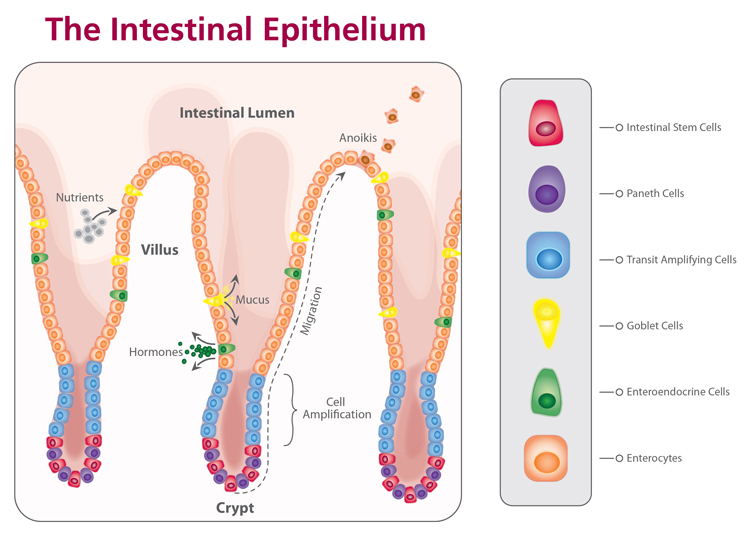The human microbiome is one of the most overlooked and under appreciated aspects of the human anatomy, mostly because it isn’t technically us. When you think of the microbiome, you instantly think of the stomach. Well, another organ the microbiome can have a large affect on is the large intestine. In my research this summer, I went in depth into how high fat diets can affect cancer and inhibit stem cell growth. Specific fats like arachidonic acid, or any type of lard, can cause stem cells to lyse and become bubble-like structures, instead of the branching structure they are supposed to have. These fats can also cause genetic discrepancies, and cause certain genes like Lgr5, which controls stem cell mitosis, to either be lessened or exponentially greatened, either way it isn’t good.
These stem cells are housed in crypts in the colon, and are surrounded by mainly Paneth cells and enterocytes, and remain dormant in these little holes in the colon until they’re called upon. When they are needed, they are used to repair possible tears in the intestine, or for some other function.
Now, you’re probably wondering what all of this has to do with the microbiome, but that’s what I will now explain. If an unbalanced diet is added to the gastrointestinal tract, it can have a negative effect on the microbiome and cause it to not do its job properly. As I previously stated, this can also inhibit the stem cell growth and reproduction in the colon, and can even cause cancer. Most of the microbiome is found in the small intestine and colon, as stomach acid makes the stomach wall almost completely sterile. Therefore, a poor diet will have the biggest impact on these two organs. If a poor diet is present, this can increase the amount of bad bacteria and parasites found in them. These parasites and bad bacteria can then damage and kill the already compromised stem cells, and can also begin to damage the intestine itself, which then can’t be repaired because of what has been done to the stem cells already.
This goes to show that what we eat can have a much bigger impact throughout our entire bodies than we can possibly imagine, and is a prime example as to why a balanced and healthy diet is necessary.



Leave a Reply